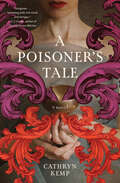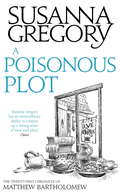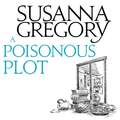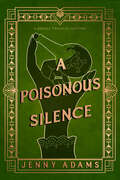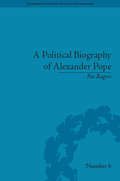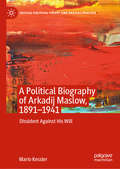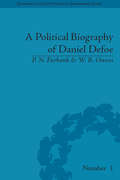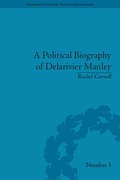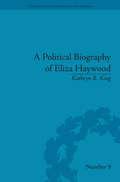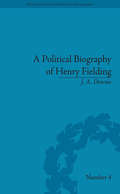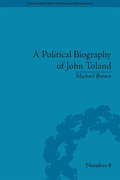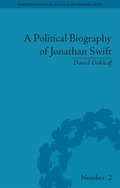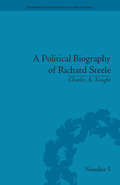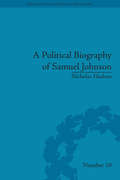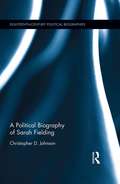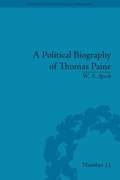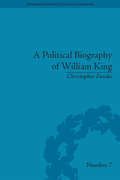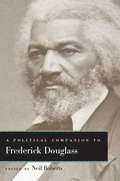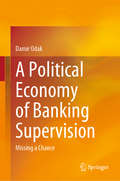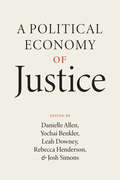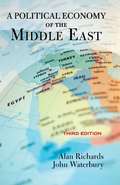- Table View
- List View
A Poisoner's Tale: A Novel (A Retelling of the Life of Giulia Tofana, Aqua Tofana Poisoner of Rome)
by Cathryn KempThe legendary figure of notorious seventeenth-century Italian poisoner Giulia Tofana, thought to be the first female serial killer in history, is brought to life in this feminist retelling.Palermo 1632: Giulia is thirteen when she learns her mother greatest secret: Teofania makes an undetectable, slow-acting, lethal poison—Acqua Tofana—which she uses to free the broken and abused women of Palermo. Now Teofania wants to pass her recipe on to her daughter, and Giulia soon realizes that in a time when women have no voice, justice is sometimes best served in a cup of wine or broth.Rome, 1656: Years later, within the alleys and shadows of the Eternal City, Giulia forms her own circle of female poisoners, who work together under the guise of an apothecary shop to sell poison to women in need. But even in a time of plague, when death looms over the city, it doesn&’t go unnoticed that the men of Rome are starting to fall like flies. And with the newly elected pope determined to rid the city of witches and heretics, Giulia is more vulnerable than ever. How far is she willing to go to continue her mother&’s legacy?Weaving together the stories of the women Giulia helped, the men she killed, and those who wanted her dead, this is a tale of magic, secrets, vengeance, and sin in the back streets of Rome—and, ultimately, a fight for power.
A Poisonous Plot: The Twenty First Chronicle of Matthew Bartholomew
by Susanna GregoryIn 1358, over a century after its foundation in Cambridge, the college of Michaelhouse is facing a serious shortfall of funds and competition from upstarts rivals such as Zachary Hostel. Their problems are made no easier by the hostility of the town's inhabitants who favour the university moving away to the Fens. This simmering tension threatens to break into violence when a well-known tradesman is found dead in one of the colleges. Matthew Bartholomew knows he was poisoned but cannot identify the actual substance, never mind the killer. He also worries that other illnesses and deaths may have been caused by the effluent from his sister's dye works. Torn between loyalties to his kin and to his college, he fears the truth may destroy both his personal and professional life, but he knows he must use his skills as a physician to discover the truth before many more lose their lives entirely.
A Poisonous Plot: The Twenty First Chronicle of Matthew Bartholomew (Chronicles of Matthew Bartholomew #21)
by Susanna GregoryThe twenty first chronicle in the Matthew Bartholomew series.In 1358, over a century after its foundation in Cambridge, the college of Michaelhouse is facing a serious shortfall of funds and competition from upstarts rivals such as Zachary Hostel. Their problems are made no easier by the hostility of the town's inhabitants who favour the university moving away to the Fens.This simmering tension threatens to break into violence when a well-known tradesman is found dead in one of the colleges. Matthew Bartholomew knows he was poisoned but cannot identify the actual substance, never mind the killer. He also worries that other illnesses and deaths may have been caused by the effluent from his sister's dye works.Torn between loyalties to his kin and to his college, he fears the truth may destroy both his personal and professional life, but he knows he must use his skills as a physician to discover the truth before many more lose their lives entirely.'A first-rate treat for mystery lovers' (Historical Novels Review)'Susanna Gregory has an extraordinary ability to conjure up a strong sense of time and place' (Choice)
A Poisonous Plot: The Twenty First Chronicle of Matthew Bartholomew (Chronicles of Matthew Bartholomew #21)
by Susanna GregoryIn 1358, over a century after its foundation in Cambridge, the college of Michaelhouse is facing a serious shortfall of funds and competition from upstarts rivals such as Zachary Hostel. Their problems are made no easier by the hostility of the town's inhabitants who favour the university moving away to the Fens. This simmering tension threatens to break into violence when a well-known tradesman is found dead in one of the colleges. Matthew Bartholomew knows he was poisoned but cannot identify the actual substance, never mind the killer. He also worries that other illnesses and deaths may have been caused by the effluent from his sister's dye works. Torn between loyalties to his kin and to his college, he fears the truth may destroy both his personal and professional life, but he knows he must use his skills as a physician to discover the truth before many more lose their lives entirely.
A Poisonous Silence (A Deadly Twenties Mystery)
by Jenny AdamsWhen a film star is poisoned in Prohibition-era Philadelphia, private investigator Edie Shippen is on the case in the second Deadly Twenties mystery, perfect for fans of Deanna Raybourn and Rhys Bowen.Philadelphia, 1921. Edie Shippen has officially started her new career as a private investigator…even though she has yet to book a client. When she runs into an old friend, the film actress Ava Sylvester, Edie is delighted at the chance to rekindle their relationship. But when Ava&’s co-star and new husband, Duncan, dies suddenly, all signs point to Ava. Edie&’s first official case begins in earnest, desperately trying to clear her friend&’s name. Gilbert Lawless has carved out a peaceful existence as a coroner&’s assistant. The last thing he wants is to jeopardize his position by involving himself with Edie Shippen. But when the body count racks up, Gilbert finds himself drawn into Edie&’s investigation on the set of Philadelphia&’s most famous film studio, where everyone seems to have something to hide.As the cameras roll, Edie and Gilbert race to catch a poisoner before one of them ends up being the next body in the morgue. With a glittering Roaring Twenties backdrop, Jenny Adams sets the stage for the second charming book in the series for fans of Miss Fisher&’s Murder Mysteries and Dead Dead Girls.
A Political Biography of Alexander Pope (Eighteenth-Century Political Biographies #6)
by Pat RogersThis is the first study to assess the entire career of Alexander Pope (1688-1744) in relation to the political issues of his time.
A Political Biography of Arkadij Maslow, 1891-1941: Dissident Against His Will (Critical Political Theory and Radical Practice)
by Mario KesslerThis book is a political biography of Arkadij Maksimovich Maslow (1891-1941), a German Communist politician and later a dissident and opponent to Stalin. Together with his political and common-law marriage partner, Ruth Fischer, Maslow briefly led the Communist Party of Germany, the KPD, and brought about its submission to Moscow. Afterwards Fischer and Maslow were removed from the KPD leadership in the fall of 1925 and expelled from the party a year later. Henceforth they both lived as communist outsiders—persecuted by both Hitler and Stalin. Maslow escaped to Cuba via France and Portugal and was murdered under dubious circumstances in Havana in November 1941. He died as a communist dissident committed to the cause of a radical-socialist labor movement that lay in ruins. Kessler considers Maslow's role in pivotal events such as the Bolshevik Revolution, in Soviet revolutionary parties and organizations, through to the rise of Stalinism and Cold War anti-communism. What results is a deep dive into the life of a key yet understudied figure in dissident communism.
A Political Biography of Daniel Defoe (Eighteenth-Century Political Biographies #1)
by P N Furbank W.R. OwensFurbank and Owens attempt to disentangle the story of Daniel Defoe’s political career, as journalist, polemicist, political theorist and secret agent. They argue that this remarkable career calls for a good deal of rethinking, not least because biography and bibliography are here inextricably intertwined.
A Political Biography of Delarivier Manley (Eighteenth-Century Political Biographies #3)
by Rachel CarnellA Tory pamphleteer, playwright and satirical historian, Delarivier Manley was regarded by her contemporaries Jonathan Swift and Robert Harley as a key member of the Tory propaganda team. This biography offers details about her life, including evidence about three illegitimate children by John Tilly, Governor of Fleet Prison.
A Political Biography of Eliza Haywood (Eighteenth-Century Political Biographies #9)
by Kathryn R KingWhile under arrest in 1750 on suspicion of producing a seditious pamphlet Eliza Haywood insisted she ‘never wrote any thing in a political way’. This study of the life and works, the first full-length biography of Haywood in nearly a century, takes the measure of her duplicity.
A Political Biography of Henry Fielding (Eighteenth-Century Political Biographies #4)
by J A DownieExisting accounts of Fielding's political ideas are insufficiently aware of the structure of politics in the first half of the eighteenth century, and of the ways in which Whig political ideology developed following the Revolution of 1688. This political biography explains and illustrates what 'being a Whig' meant to Fielding.
A Political Biography of John Toland (Eighteenth-Century Political Biographies #8)
by Michael BrownJohn Toland was notorious. A pamphleteer, a polemicist and a prankster of the first order, modern scholarship has struggled to position his writings within the debates of his day. This study is the first to fully recount his remarkable biography, situating his writings within the controversies that sparked and shaped them.
A Political Biography of Jonathan Swift (Eighteenth-Century Political Biographies #2)
by David OakleafMost famous as the author of "Gulliver's Travels", Jonathan Swift (1667-1745) was one of the most important propagandists and satirists of his day. This study seeks to contextualize Swift within the political arena of his day.
A Political Biography of Richard Steele (Eighteenth-Century Political Biographies #5)
by Charles A KnightRichard Steele is famous as an early writer of sentimental drama and as half of the writing team, Addison and Steele. He is notable both for the indirect propaganda he developed with Addison and for the open partisanship of his own periodicals. He wrote extensively about responsible economics but was famously irresponsible in his own affairs.
A Political Biography of Samuel Johnson (Eighteenth-Century Political Biographies #10)
by Nicholas HudsonJohnson rose from obscure origins to become a major literary figure of the eighteenth century. Through a detailed survey of his major works and political journalism, Hudson constructs a complex picture of Johnson as a moralist forced to accept the realistic nature of politics during an era of revolutionary transition.
A Political Biography of Sarah Fielding (Eighteenth-Century Political Biographies)
by Christopher D JohnsonA Political Biography of Sarah Fielding provides the most complete discussion of Fielding’s works and career currently available. Tracing the development of Fielding’s artistic and instructive agendas from her earliest publications forward, Johnson presents a compelling portrait of a deeply read author who sought to claim a place within literary culture for women’s experiences. As a practical didacticist, Fielding sought to teach her readers to live happier, more fulfilling lives by appropriating and at times resisting the texts that defined their culture. While Fielding often retreats from the overtly political concerns that captured the attention of her contemporaries, her works are daring forays into the public sphere that both challenge and reinforce the foundations of British society. Giving voice to those who have been marginalized, Fielding’s creative productions are at once conservative and radical, revealing her ambiguous appreciation for tradition, her fears of modernity, and her abiding commitment to women who must live within forever imperfect worlds.
A Political Biography of Thomas Paine (Eighteenth-Century Political Biographies #11)
by W A SpeckSpeck's biography examines Paine's work afresh, in light of new thinking about the role of religion in the formation of his political ideology, and also places Paine within the recently-developed context of 'Atlantic History'.
A Political Biography of William King (Eighteenth-Century Political Biographies #7)
by Christopher FauskeWilliam King (1650–1729) was perhaps the dominant Irish intellect of the period from 1688 until his death in 1729. An Anglican (Church of Ireland) by conversion, King was a strident critic of John Toland and the clerical superior of Jonathan Swift.
A Political Companion to Frederick Douglass (Political Companions to Great American Authors)
by Neil Roberts“A splendid opportunity to rethink Douglass’s political thought . . . relevant today given the discourse of white nationalism in the United States.” —ChoiceFrederick Douglass was a writer and public speaker whose impact on America has been long studied by historians and literary critics. Yet as political theorists have focused on the legacies of such notables as W.E.B. Du Bois and Booker T. Washington, Douglass’s profound influence on Afro-modern and American political thought has often been undervalued.In an effort to fill this gap in the scholarship on Douglass, editor Neil Roberts and an exciting group of established and rising scholars examine the author’s autobiographies, essays, speeches, and novella. Together, they illuminate his genius for analyzing and articulating core American ideals such as independence, liberation, individualism, and freedom, particularly in the context of slavery. The contributors explore Douglass’s understanding of the self-made American and the way in which he expanded the notion of individual potential by arguing that citizens had a responsibility to improve not only their own situations but also those of their communities.A Political Companion to Frederick Douglass also considers the idea of agency, investigating Douglass’s passionate insistence that every person in a democracy, even a slave, possesses an innate ability to act. Various essays illuminate Douglass’s complex racial politics, deconstructing what seems at first to be his surprising aversion to racial pride, and others explore and critique concepts of masculinity, gender, and judgment in his oeuvre. The volume concludes with a discussion of Douglass’s contributions to pre- and post-Civil War jurisprudence.“Rich insights from scholarship both old and new. A fine collection.” —Political Theory
A Political Economy of American Hegemony
by Thomas OatleyIn A Political Economy of American Hegemony, Thomas Oatley explores how America's military buildups have produced postwar economic booms that have culminated in monetary and financial crises. The 2008 subprime crisis - as well as the housing bubble that produced it - was the most recent manifestation of this buildup, boom, and bust cycle, developing as a consequence of the decision to deficit-finance the wars in Afghanistan and Iraq. Earlier instances of financial crises were generated by deficit-financed buildups in the 1980s and the late 1960s. The buildup, boom, and bust pattern results from the way political institutions and financial power shape America's response to military challenges: political institutions transform increased military spending into budget deficits, and financial power enables the United States to finance these deficits by borrowing cheaply from the rest of the world. Oatley examines how this cycle has had a powerful impact on American and global economic and financial performance.
A Political Economy of Banking Supervision: Missing a Chance
by Damir OdakThis book examines the effect of banking on the real economy and society, focusing on banking supervision as the decisive factor in steering banking activities and determining the social outcome of the game of finance. Banking is like a cardiovascular system for our society. If it functions correctly, it allows the economy to operate smoothly. On the other hand, if it malfunctions it becomes a doomsday device. This creates an asymmetry of risks – the asymmetry between the potential dire consequences and the modest rewards of accepting those risks. Banking was one of the critical technological factors enabling the transition from the middle ages and the creation of modern society. However, while today it contributes little to economic growth, its malfunction has a profound and lasting adverse impact.The book explains why, how and what. Why is it important to keep tight supervision of the banks? How can banking supervision improve stability, not only of the financial system but also of the whole human society? What went wrong with the regulation in the past?
A Political Economy of Justice
by Leah DowneyDefining a just economy in a tenuous social-political time. If we can agree that our current social-political moment is tenuous and unsustainable—and indeed, that may be the only thing we can agree on right now—then how do markets, governments, and people interact in this next era of the world? A Political Economy of Justice considers the strained state of our political economy in terms of where it can go from here. The contributors to this timely and essential volume look squarely at how normative and positive questions about political economy interact with each other—and from that beginning, how to chart a way forward to a just economy. A Political Economy of Justice collects fourteen essays from prominent scholars across the social sciences, each writing in one of three lanes: the measures of a just political economy; the role of firms; and the roles of institutions and governments. The result is a wholly original and urgent new benchmark for the next stage of our democracy.
A Political Economy of Justice
by Leah DowneyDefining a just economy in a tenuous social-political time. If we can agree that our current social-political moment is tenuous and unsustainable—and indeed, that may be the only thing we can agree on right now—then how do markets, governments, and people interact in this next era of the world? A Political Economy of Justice considers the strained state of our political economy in terms of where it can go from here. The contributors to this timely and essential volume look squarely at how normative and positive questions about political economy interact with each other—and from that beginning, how to chart a way forward to a just economy. A Political Economy of Justice collects fourteen essays from prominent scholars across the social sciences, each writing in one of three lanes: the measures of a just political economy; the role of firms; and the roles of institutions and governments. The result is a wholly original and urgent new benchmark for the next stage of our democracy.
A Political Economy of Justice
by Leah DowneyDefining a just economy in a tenuous social-political time. If we can agree that our current social-political moment is tenuous and unsustainable—and indeed, that may be the only thing we can agree on right now—then how do markets, governments, and people interact in this next era of the world? A Political Economy of Justice considers the strained state of our political economy in terms of where it can go from here. The contributors to this timely and essential volume look squarely at how normative and positive questions about political economy interact with each other—and from that beginning, how to chart a way forward to a just economy. A Political Economy of Justice collects fourteen essays from prominent scholars across the social sciences, each writing in one of three lanes: the measures of a just political economy; the role of firms; and the roles of institutions and governments. The result is a wholly original and urgent new benchmark for the next stage of our democracy.
A Political Economy of the Middle East
by John Waterbury Alan RichardsIn their political economy of the Middle East, Richards (economics and environmental studies, U. of California at Santa Cruz, US) and Waterbury (president, American U. of Beirut, Lebanon) focus on major thematic problems of social and economic transformation rather than focus on specific countries. Their analysis centers on the interaction of strategies of economic transformation, state agencies and actors seeking to implement said strategies, and social actors that react to and are shaped by the above, thus addressing questions of the nature of the state, the emergence of economic interests, and the effects of various development strategies. Individual chapters address economic growth and structural change; the impact of demographic change; health, education, and labor markets; water and food security; the emergence of the public sector; contradictions of state-led growth; the "Washington Consensus" and the market-state mix; urban political economy; political regimes as viewed by themselves and others; solidarism and its enemies; the military and the state; Islamism; and regional economic integration and labor migration. Annotation ©2008 Book News, Inc. , Portland, OR (booknews. com)
